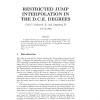Free Online Productivity Tools
i2Speak
i2Symbol
i2OCR
iTex2Img
iWeb2Print
iWeb2Shot
i2Type
iPdf2Split
iPdf2Merge
i2Bopomofo
i2Arabic
i2Style
i2Image
i2PDF
iLatex2Rtf
Sci2ools
106
click to vote
MSCS
2006
2006
Restricted jump interpolation in the d.c.e. degrees
It is shown that for any 2-computably enumerable Turing degree l, any computably enumerable degree a, and any Turing degree s, if l = 0 , l < a, s 0 , and s is c.e. in a, then there is a 2-computably enumerable degree x with the following properties: (1) l < x < a, and (2) x = s.
| Added | 14 Dec 2010 |
| Updated | 14 Dec 2010 |
| Type | Journal |
| Year | 2006 |
| Where | MSCS |
| Authors | Carl G. Jockusch Jr., Angsheng Li |
Comments (0)

